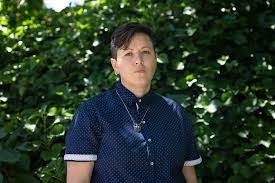 Saren Craig (they, them), a former student at College of the Ozarks, is a plaintiffs in a class-action lawsuit against the U.S. Department of Education that argues the religious exemption to Title IX violates the civil rights of LGBTQ+ people.
Saren Craig (they, them), a former student at College of the Ozarks, is a plaintiffs in a class-action lawsuit against the U.S. Department of Education that argues the religious exemption to Title IX violates the civil rights of LGBTQ+ people.
The subject line read “Notice of Charge." But Hargrove misread the line at first, thinking it read “Notice of Change” and had something to do with her new course schedule. The semester had just started, and Hargrove was still ironing out which classes to drop or keep. Yet once she scanned the words on her phone, it quickly became clear that Hargrove was wrong.
“I was really kind of blindsided, especially with misreading the email at first,” said Hargrove. “It was basically my school telling me that they knew that I’m trans, and that I can either withdraw or face a disciplinary committee because of this. What am I going to do?”
A few months earlier in 2020, Hargrove had started transitioning to living as a woman. She had only recently realized and accepted that she identified as a transgender woman. Hargrove was already enrolled full-time at LCU in 2020 after serving in the U.S. Air Force for almost nine years. She grew up in a religious household and sought a career in the ministry. Faith was — and still is — an important part of her. This email from her own faith-based college, however, devastated her.
“They were literally saying because you’re trans, that’s a disciplinary problem,” said Hargrove. “But I am trans. I have nothing to defend against. That’s just true. It’s part of who I am.”
Hargrove said that LCU's email to her stated that she was “choosing to identify and live as a transgender woman.” In recent months before that notice, Hargrove had written a few blog posts and academic papers in which she mentioned that she was transgender. Hargrove said that she doesn’t know how the institution learned about her transition unless they read her writings.
According to LCU, identifying as transgender violated the Student Handbook and was a “lifestyle choice that did not comply with our behavioral expectations.” Hargrove stared at the words on her phone in disbelief.
“And I was still in the parking lot of my kids’ school while reading that email,” said Hargrove. “I still had to pick them up, make my kids dinner, and put them to bed for school the next day. So, I pushed down all of my feelings for the rest of the day. I was kind of numb. Until that night when my kids were in bed asleep, it just all came out. It was overwhelming. People don’t have to be that awful.”
With LCU offering Hargrove a choice to stay enrolled yet face a Disciplinary Committee for further action or to drop out and face no further action, Hargrove decided to leave the institution.
But Hargrove soon pushed back. In October 2021, an advocacy group filed a Title IX complaint on behalf of Hargrove against LCU with the U.S. Department of Education (ED)’s Office for Civil Rights (OCR). Title IX is a federal civil rights law that prohibits sex-based discrimination in any school or other education program that receives funding from the federal government. Because LCU gets taxpayer dollars, it is a Title IX compliant school.
“I honestly thought that Title IX was this thing that was universal,” said Hargrove on her complaint. “You don’t necessarily think that there are exemptions to discriminate. That’s not something you should have to worry about.”
Yet, as Hargrove and many other LGBTQ+ students at religious colleges have discovered to their shock, they are not protected under Title IX. Faith-based colleges can claim a religious exemption to the federal anti-discrimination law. Hargrove remembered when she first learned this.
“That’s when it really dawned on me how much I wasn’t actually safe when I was at this school,” she said. “Even though they have a Title IX policy and get federal aid, I didn’t get the protection like I should have. That realization that I could actually be discriminated against, that this isn’t a safe space, it’s really scary. It’s disheartening. You believe there are these laws that help people, then you realize that they are optional.”
Hargrove also joined a class-action lawsuit against ED that argues the religious exemption to Title IX violates the civil rights of LGBTQ+ people. In March 2021, the Religious Exemption Accountability Project (REAP), a nonprofit advocacy group, filed this lawsuit on behalf of 33 LGBTQ+ students and alumni from religious colleges. The case is called Elizabeth Hunter, et. al. v. U.S. Department of Education.
"There's not really another way to tell a group of people that they don't matter than to say that you're funding their discrimination and profiting from it," said Hargrove, referring to ED and the federal student loans that many students take through ED to be able to attend college.
REAP was also the advocacy group that also filed the Title IX complaint against LCU on Hargrove's behalf.
"This story of students being discriminated against has been happening for years, but it has flown under the radar," said Joe Baxter, one of the attorneys at REAP who is representing the plaintiffs in the class-action lawsuit. "There is also a big power imbalance for students. Many of them come from homes or communities where being openly LGBTQ+ is not acceptable. They may not be out to themselves when they start college. And if they come out, all of a sudden, these schools crack down on them."
With College Pulse, REAP released a report in March 2021 that surveyed 3,000 students mainly at schools aligned with the Council for Christian Colleges & Universities. The report found that 12% of students on such campuses identify as LGBTQ+. In addition, it detailed stark disparities in mental health outcomes for LGBTQ+ students at religious colleges.
“The students are so brave,” said Baxter with regards to the plaintiffs who have come forward. “Especially current students. They are at real risk of retaliation. Entire communities can often be hostile to them. But they are standing up. They are telling their stories publicly. It’s becoming part of the record.”
Saren Craig, who uses they/them pronouns and is 39 years old, is one of the plaintiffs who faced discrimination two decades ago at a religious college. In 2001, they started their first undergraduate year at College of the Ozarks (C of O). Craig’s father went to C of O, a small, Christian college in Missouri. Their family wanted Craig to attend there as well.
But soon after the 19-year-old Craig arrived at C of O, they realized that they were developing close feelings for a female friend. That realization pushed Craig into anxiety and depression. Yet when Craig told a school counselor at C of O about their feelings, the counselor said that their sexuality and gender identity were “pathological” and caused by "abuse." Craig underwent conversion therapy while at C of O, marking a dark period in their life.
“It caused a lot of issues for me personally,” said Craig, who later left C of O because “everything felt contrived and disingenuous.” They then joined the Air Force and finished their undergraduate degree at the University of Missouri-Kansas City in 2014 following their military service.
“For a lot of LGBTQ+ students coming out of religious homes, they basically are under the control of their parents,” said Craig. “Their parents are paying for their education and expect them to go through with their education at that religious college. That's really hard.”
Blaze Bowers, assistant vice president for academic and student support services at Lincoln Memorial University, studied higher education law and policy, particularly Title IX, while at Stetson University’s College of Law in its Center for Excellence in Higher Education Law & Policy. He has been following REAP’s class-action lawsuit closely and pointed out its potential to be historic.
“There is no case law, no federal decision that has addressed the constitutionality of the religious exemption yet,” said Bowers. “We do have case law on specific circumstances as to whether an exemption is applicable. But not whether the exemption itself is constitutional.”
When Congress created Title IX in 1972, Bowers said lawmakers included a religious exemption statute largely to address a concern. Title IX could violate the First Amendment when it came to religious liberties and then be deemed unconstitutional, which led to the exemption. Yet Bowers said that this class-action lawsuit raises that constitutionality question again in a new climate.
The Biden administration recently issued guidance that sex-based discrimination under Title IX can include gender identity and sexual orientation. Bowers said this move may have opened the door for REAP’s landmark lawsuit to launch in March 2021.
Under the Trump administration, higher education institutions were no longer required to submit a written letter to ED’s OCR for a formal assurance that they were exempt from Title IX.
Yet this remains in place under the Biden administration. Hargrove pointed out that LCU did not have to submit a letter to ED claiming an exemption before ED notified the university of her complaint.
“Now, a school could never put in a letter to OCR asking for an exemption,” said Bowers. “If OCR was investigating them tomorrow, they could invoke a religious exemption right there and claim it as a defense. They still have to meet the requirements for that exemption, such as showing that they are a religious organization, but they can do so at any time.”
Jorge Valencia is the executive director and CEO of the Point Foundation, the nation’s largest scholarship-granting organization for LGBTQ+ students of merit. He grew up in a Mormon family and attended Brigham Young University (BYU), a private institution sponsored by the Church of Jesus Christ of Latter-Day Saints that receives federal funding.
There have been several Title IX complaints filed against BYU from LGBTQ+ students reporting discrimination. But BYU has continuously claimed a religious exemption.
At Point, Valencia said that he gets applications from about 2,000 LGBTQ+ students a year vying for 20 to 30 scholarship spots. Point has supported LGBTQ+ students who went to BYU in the past. Some were still attending BYU while others needed to leave due to a lack of support.
“We are able to see first-hand the challenges that LGBTQ+ students have faced, whether it’s that they lost a scholarship because someone found out that they were LGBTQ+ or their family rejected them and they don’t know how they’re going to pay for their education,” said Valencia.
Earlier this month, ED dismissed yet another Title IX complaint against BYU from LGBTQ+ students, given the institution’s religious exemption. Valencia pointed out the harm that discrimination against LGBTQ+ students on campus can cause.
“Granted, things have changed since the time I’ve been at BYU,” said Valencia. “But the suicide rates in Utah for LGBTQ+ people are almost double those of their heterosexual peers. When institutions talk about Christlike behavior yet push students or people away, they’re sending a message to other students on campus that this group of individuals is probably less [than]. "I think that lends itself to the bullying that LGBTQ+ students often experience on campus.”
For decades, Dr. Caitlin Ryan, director of the Family Acceptance Project at San Francisco State University, has researched and worked with LGBTQ+ youth, their families, and faith communities to combat the negative health impacts of such discrimination. Ryan said she seeks to meet religious families where they are.
“Part of the tragedy here is some parents feel like denying their child’s identity will help them fit in and do well in life, but what they don’t understand is that this is contributing to their child’s alienation, to their child's mental health risks, and to conflict within the family,” said Ryan.
Through her work at the Family Acceptance Project, Ryan has developed evidence-based tools that religious families and communities can use to better support LGBTQ+ youth, including college-aged students.
“LGBTQ people reared in religious families are also more likely to report rejection and religious-based rejection,” said Ryan, referring to related studies. “But when you think of the world’s major religions, they’re underlying values are mercy, compassion, and love. They’re not hurting people.”
She also noted that schools, including colleges, reflect a community's values. And when a school supports LGBTQ+ people, this can “dramatically” help queer students who may experience rejection at home from their families.
Although it could be months before the REAP lawsuit is resolved, Bowers said the case is part of a bigger shift in higher education law.
“These next couple of years, say from now to 2030, could be defining moments in higher education, specifically religious higher education,” said Bowers. “We’re looking at a reckoning, and higher education will need to see: is it going to all burn down or can we reclaim these institutions and find that balance of interests?”
He referred again to a legal tension between religious liberties and anti-discrimination. To Valencia, no such tension should exist.
"Whether you're LGBTQ+ or not, there are many of us who have a belief in God," said Valencia. "And it's too bad that some people don't find that those two can coexist. That's what I find sad."
Valencia added that ED’s stance on the religious exemption under Biden has been unclear.
“Frankly, it’s a bit confusing to me,” he said. “Do I think clarity is needed? Absolutely. I think this is where a lot of young people in our community don’t know where they stand. I think that’s what’s driving a lot of people to reexamine this issue.”
As for Hargrove, she and her fellow plaintiffs will continue pushing their lawsuit forward. Hargrove is currently a distance learner at United Theological Seminary in Minnesota. She said the institution has been affirming of her gender identity. Yet Hargrove will graduate a year later than planned because not all of her credits from LCU transferred when she left the institution.
Hargrove noted as well that the increasing violence against trans people across the country has only fortified her commitment to telling her story.
“It's becoming more commonplace for trans people to be discriminated against in public," she said. "On top of that, we have more anti-trans legislation coming forth every single day. Put yourself in our situation. What would it mean to have people openly making it legal to discriminate against the person you are for just being the person you are?"
Today, Craig is a professional counselor associate who often works with people in the queer community. They had a message for LGBTQ+ students currently facing discrimination at religious colleges: “I’d like students to know that there is support out there for them. There are people fighting for them."
Diverse reached out to LCU, College of the Ozarks, and BYU for comment. LCU and College of the O did not respond. A BYU spokesperson directed Diverse to the university's February 10 press release on ED’s recent dismissal of a Title IX complaint. Last month, LCU released a statement that acknowledged Hargrove’s Title IX complaint and said that it declined to comment further.
Rebecca Kelliher can be reached at [email protected]



















